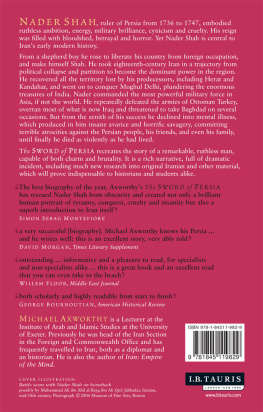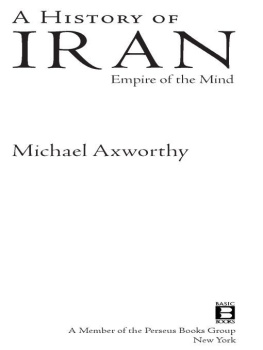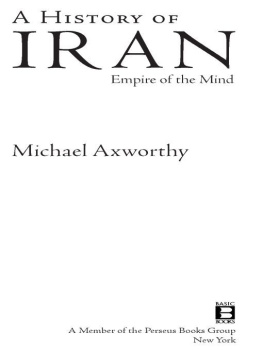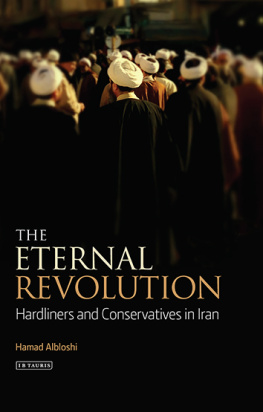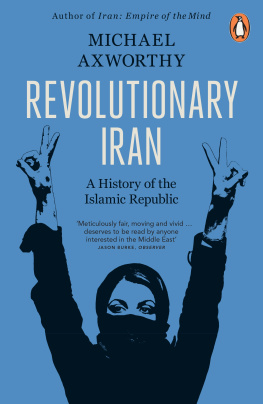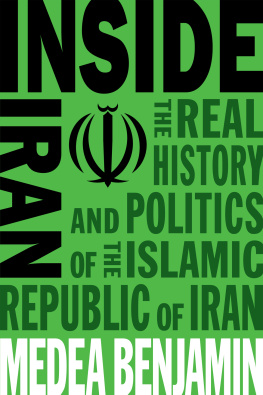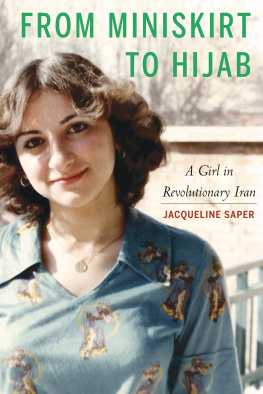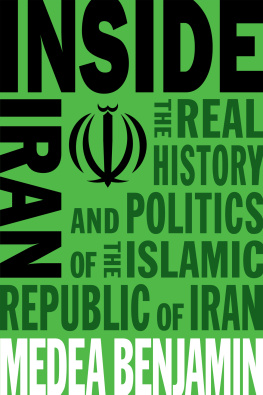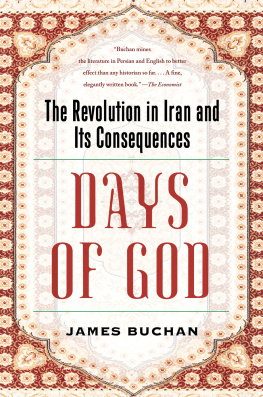Revolutionary Iran
Revolutionary Iran
A History of the Islamic Republic
MICHAEL AXWORTHY


Oxford University Press is a department of the University of Oxford.
It furthers the Universitys objective of excellence in research,
scholarship, and education by publishing worldwide.
Oxford New York
Auckland Cape Town Dar es Salaam Hong Kong Karachi
Kuala Lumpur Madrid Melbourne Mexico City Nairobi
New Delhi Shanghai Taipei Toronto
With offices in
Argentina Austria Brazil Chile Czech Republic France Greece
Guatemala Hungary Italy Japan Poland Portugal Singapore
South Korea Switzerland Thailand Turkey Ukraine Vietnam
Oxford is a registered trade mark of Oxford University Press
in the UK and certain other countries.
Published in the United States of America by
Oxford University Press
198 Madison Avenue, New York, NY 10016
Copyright 2013 by Michael Axworthy
All rights reserved. No part of this publication may be reproduced,
stored in a retrieval system, or transmitted, in any form or by any means, without the
prior permission in writing of Oxford University Press, or as expressly permitted by law,
by license, or under terms agreed with the appropriate reproduction rights organization.
Inquiries concerning reproduction outside the scope of the above should be sent
to the Rights Department, Oxford University Press, at the address above.
You must not circulate this work in any other form
and you must impose this same condition on any acquirer.
Library of Congress Cataloging-in-Publication Data
Axworthy, Michael.
Revolutionary Iran : a history of the Islamic republic / Michael Axworthy.
pages cm
Summary: A tour through recent Iranian history from the 1979 Islamic revolution through
the summer of 2009, when Iranians poured into the streets of Tehran by the hundreds of thousands,
demanding free, democratic government. Axworthy argues that the Iranian revolution was centrally
important in modern history because it provided the world with a clear model of development that
was not rooted in Western ideologies.Provided by publisher.
ISBN 978-0-19-932226-8 (hardback)
1. IranHistoryPahlavi dynasty, 19251979. 2. IranHistoryRevolution, 1979.
3. IranHistory19791997. 4. IranHistory1997 5. IranPolitics and government19411979.
6. IranPolitics and government19791997. 7. IranPolitics and government1997 I. Title.
DS318.A88 2013
955.054dc23 2013015836
1 3 5 7 9 8 6 4 2
Printed in the United States of America
on acid-free paper
In memory of Isabelle Borg (19592010)
and Chris Rundle (19382012)
Question: You have been accused of cynicism, but a more recent suggestion is that you take the view that, in the face of the transcendence of God, no moral or political system has any authority.
Answer: I think one needs to put into that sentence No absolute authority, because I obviously dont believe it to be the case that no moral or political system can have authority. One has, I think, to be very mindful of the limits and ignorance of even legitimate government.
Maurice Cowling, answering a question from Naim Attalah in 1990
Contents
Images 13, 8, 1213, 1729 and 31 copyright Getty Images; images 47 and 910 copyright David Burnett/Contact Press, from the book 44 Days: Iran and the Remaking of the World (FocalPoint); images 11 and 1516 copyright Fouman.com; image 30 copyright Bahman Sadeghi
Many people helped me to write this book. Prime among them were Baqer Moin and the late Chris Rundle, who both read the whole text and commented extensively. Chriss death in March 2012 was a shock and a great sadness to all who knew him he was a kind, modest and generous man, and a deeply knowledgeable, wise and sympathetic authority on all matters Iranian. I also profited by extensive comments and help from Mahnaz Zahirinejad, Ali Mossadegh and Siavush Ranjbar-Daemi; and (on specific points or more limited sections of the book) from Ali Ansari, Mahdi Dasht-Bozorgi, Sadegh Zibakalam, Luciano Zaccara, Farhad Taheri, Mark Gasiorowski, Esmail Khoie, Wayne White, Hamid Naficy, Walter Posch, Hashem Ahmadzadeh, Farhang Jahanpour, Dominic Brookshaw, Ahmad Salamatian, Shirin Ebadi, Christopher Andrew, Lord Owen and Haideh Sahim. For part of the period of writing I was living in New Delhi, where I benefited from the debates at the School of International Studies at Jawaharlal Nehru University; and through the kindness of Professors A. K. Pasha, Gulshan Dietl and P. R. Kumaraswamy, I was made a visiting scholar there. I also had the good fortune to meet Dr Seyyed Yunus Jaffery, to benefit from his advice and several long conversations, and to visit the havelis of Old Delhi, and the roof of the Sunehri mosque. I am grateful to everyone at Penguin Books for their help towards publication especially Simon Winder, Marina Kemp, Richard Duguid, David Watson and Penelope Vogler, who for me have confirmed that Penguin is, as ever, the Rolls Royce of international publishing. I also have to thank my colleagues at the Institute of Arab and Islamic Studies at the University of Exeter for their help and support especially Gareth Stansfield, Rob Gleave, Sajjad Rizvi, Lenny Lewisohn and Tim Niblock; my students, for their liveliness and their patience; my children, for theirs; my agent, Georgina Capel, for her sound advice and unfailing cheerfulness; and as ever, my wife Sally.
Note on Transliteration
In my books I have sought to transliterate Persian words in a way that will sound familiar rather than alien to Iranians, and I have tried (and occasionally failed) to be consistent. Beyond that, in my view, there is room for dispute, but little for any claim to absolute correctness.
Introduction:
The Hidden Continent of Iran
In the summer of 2009 the world was watching Iran. Not because of the unresolved question of Irans nuclear programme, nor Irans troubled relationship with the United States, nor (at least not primarily) because of human rights abuses. The world and its media-wife were watching Iran because, thirty years after the Islamic revolution of 1979 (and a hundred years after the Constitutional revolution of 190611), Iranians were again on the streets of Tehran in hundreds of thousands, demanding free, democratic government and an end to tyranny. Iranians sometimes have an exaggerated sense of their countrys importance in the world. But for once it appeared justified. Would the Islamic republic fall? Or might it shift to a more open, freer version of itself that permitted elections to run their course in contrast to the manipulated process enforced by repression many believed they had suffered after 12 June 2009? If there is a spirit of movement and change in world events, which moves from place to place over time according to crises in human affairs, then that spirit was alive in Tehran in the summer of 2009.
As it turned out, repression seemed to succeed that time. The spirit moved on, after a pause, to other places in the region, to Tunisia, Egypt and Libya, where it was more successful; and to Bahrain and Syria. In Iran, repression has deepened. But the story is not yet over. Iran appeared central then and continues to be of central importance.
This book is about the history of Iran since the beginning of the Islamic revolution of 19789. But, as with any historical subject, the roots of events go back long before the events themselves. This is, if possible, all the more so with Iran; a country with a long, complex history that is for the most part unknown to ordinary citizens of Western countries something that often frustrates and irritates Iranians, who are proud of their history and their contribution to world civilization. The apparent strangeness of Iranian politics and Iranian behaviour in the last thirty or forty years is only explicable through an understanding of the history of the country. So, although this book is focused on the revolution of 19789 and the three decades since then, it is necessary to go back further into the history of the twentieth century, and even beyond (for the history of Shiism for example) to explain recent events.
Next page

